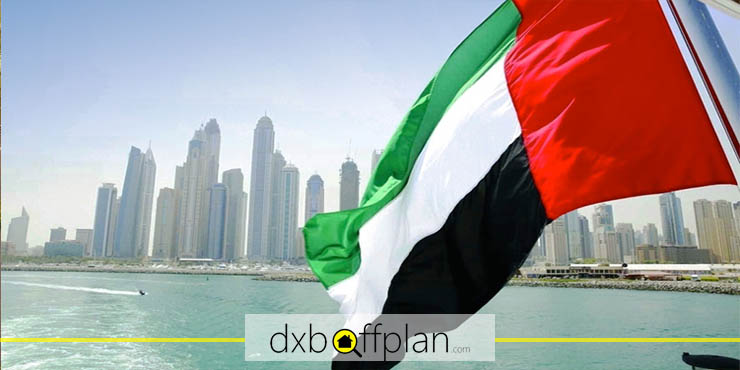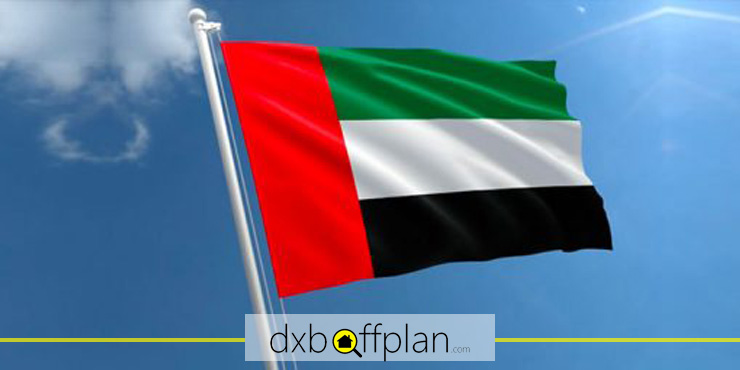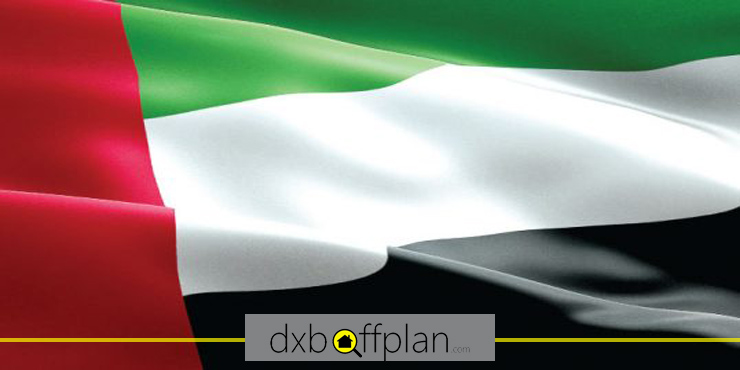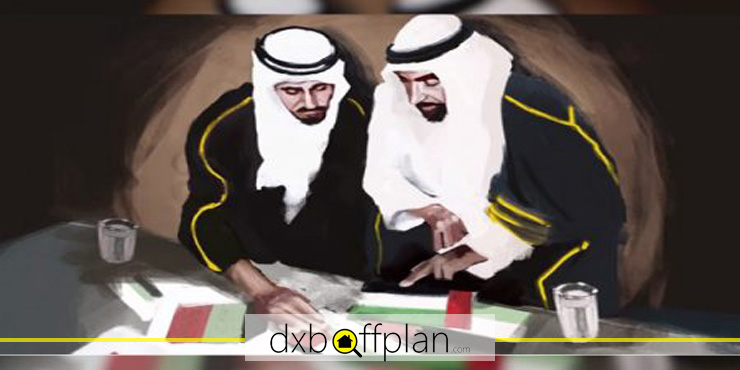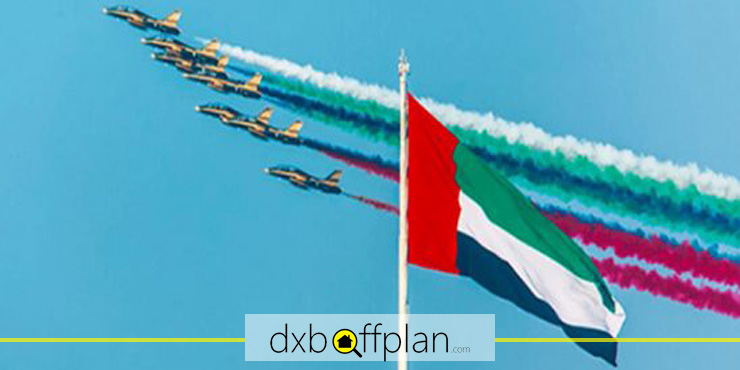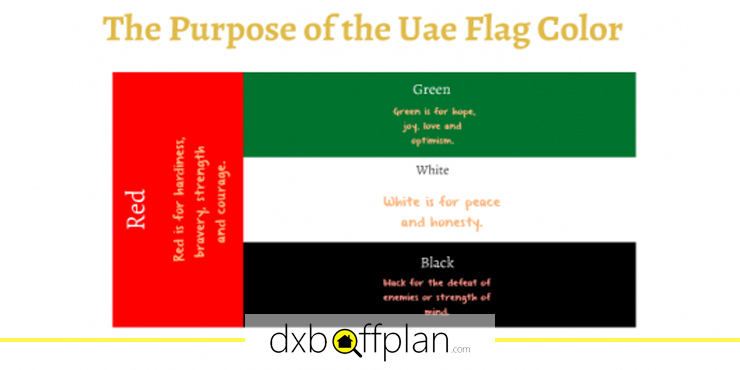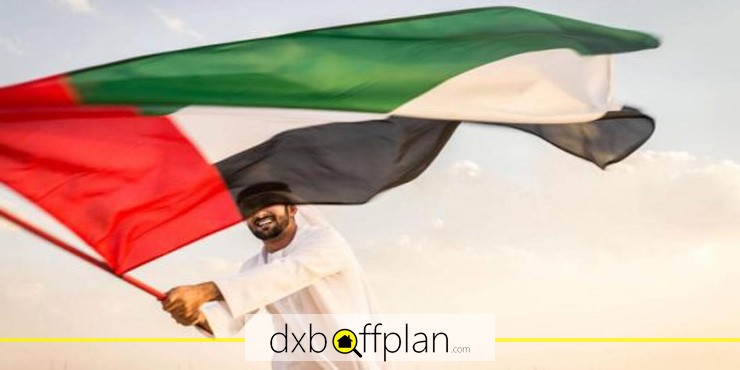History of The UAE Flag; Meaning of UAE Flag Colors
If you pay a visit to UAE’s major cities, such as Dubai or Abu Dhabi, the well-developed city infrastructure and ultra-modern urban architecture you witness might leave you with the impression that the UAE is an old nation and has come a long way to reach this extent of development. The truth, however, is otherwise. The country we know today as the United Arab Emirates was born in 1971. The country was formed by uniting seven small emirates, which were under the British protectorate. This union between the seven states formed the modern UAE, and since then, the country has experienced tremendous growth and development.
Being a relatively young nation with deep roots in the rich Arabian culture, the UAE has many fresh stories to share, including the history of its flag. What does it symbolize? When did it come to be? Who designed it? In this article, we are going to review the history of the UAE flag. Read on to find the answer to these questions.
A Brief Summary of the UAE’s History
After long years of war over the control of trade routes in the Oman Sea, the British government intervened and signed a truce in 1820, known as the General Maritime Treaty, with the coastal tribes residing in southeastern Arabia. These tribal confederacies that signed protective treaties with the British government were eventually known as the Trucial States of the Coast of Oman. The Trucial States represented themselves with a red and white flag, a white stripe in the middle, and two red stripes above and below it. In the center of the flag was also a green seven-pointed star representing the seven sheikhdoms.
Further treaties and agreements were signed between the British government and the Trucial States themselves. Over time, smaller sheikhdoms joined their larger neighbors to form the emirates. In 1960, the discovery of oil in the region prompted the Emirates to join forces and form a unified nation.
Sheikh Zayed bin Sultan Al Nahyan, the ruler of Abu Dhabi, led the unification movement. In 1971, when the truce with the British government was abolished, six of the emirates allied with each other and formed the United Arab Emirates. Sheikh Zayed became the first country’s president. The seventh emirate, Ras Al Khaymah, joined the union in 1972.
Since the UAE’s birth, Al Maktoum and Al Nahyan, royal families have put a lot of effort into the UAE’s growth. They are now the most prominent royal families of the UAE and are rulers of the Emirates of Dubai and Abu Dhabi (read our guide to royal families of the UAE to learn more).
History of the UAE Flag
On the 2nd day of December 1971, the emirates of Abu Dhabi, Fujairah, Sharjah, Dubai, Umm Al Quwain, and Ajman united under one flag and formed the United Arab Emirates. In order to depict the unity of the Emirates, a new national flag was designed featuring the Pan-Arab colors red, green, white, and black. On December 2nd, the UAE National Flag was raised for the first time by the nation’s founding father, Sheikh Zayed bin Sultan Al Nahyan.
This momentous event has been commemorated every year since 1971 by the UAE people. The government has declared December 2nd a public holiday called the UAE National Day. On the UAE National Day, the country is a riot of color with a plethora of fun and joy when everyone celebrates the nation’s independence. If you’re curious about what happens during this national holiday, read our article “Things to Do on the UAE National Day” to learn more.
Interesting UAE Flag Facts
Now that you know a brief history of the nation and the UAE flag, let’s review a number of interesting facts:
Shape of the UAE Flag
The UAE flag is a rectangle with a length twice its width. It consists of four rectangular stripes, each of a distinct color. The vertical stripe is red and fills the left segment of the flag. The three horizontal stripes constitute the rest of the flag and are arranged horizontally, with the green one on the top, white in the middle, and black below.
Designer of the UAE Flag
The UAE flag was designed by Abdullah Mohammed Al Maaniah in 1972. He was only 19 years old back then! Two months prior to the unification of the emirates and the birth of the UAE, Al Diwan Al Amiri (The Ruler’s Court) of Abu Dhabi sponsored a competition for designing a national flag for the UAE. An advertisement announcing the competition was published in Abu Dhabi’s Al Ittihad newspaper.
The young Abdullah saw the announcement and joined the competition. More than a thousand designers participated in the competition, of whom only 6 designs made it to the short-list. Ultimately, the authorities chose Abdullah’s design. The funny thing is Abdullah was not informed that his design had been selected! He found out when he traveled to the royal palace of Abu Dhabi to watch the rising of the flag. When Sheikh Zayed raised the flag for the first time in 1971, Abdullah realized he had won the competition. Several months after the announcement of UAE independence, he was recognized by the authorities and received a prize money of 4000 riyals.
Later, Abdullah became the UAE ambassador to many foreign regions. In 2011, he had an interview with The National newspaper in which he explained how he was inspired to come up with the UAE flag design. To him, black was a representation of the oil that ran beneath the land and transformed the UAE, green was a reflection of prosperity and fertility, and red and white were the main colors used in the flag of each of the Emirates.
The UAE Presidential Flag and the UAE Emblem
There are not any shapes or emblems on the UAE flag. However, there is a special flag version that carries the UAE emblem. Only the UAE president is allowed to carry this version of the flag, and that’s why it is dubbed the UAE presidential flag.
The presidential flag features an open-winged falcon holding onto a parchment with the Arabic name of the nation. The UAE’s official emblem was originally a golden hawk with a circular red shield along with seven stars and a white Arabian sailboat on the front. However, the emblem changed in 2008, and the red shield was replaced with a circular UAE flag encircled by seven stars (representations of the seven emirates of the UAE).
History of the UAE Flag Colors
Before the unification of the seven emirates of the UAE, each emirate had its own specific flag. After the UAE’s declaration of independence, the four-colored UAE flag became the national flag of all Emirates. However, the Emirates still retains its traditional flag and flies it next to the national flag. In many cities, though, such as Dubai and Abu Dhabi, only the national flag is displayed to show national solidarity. Perhaps it is befitting for these Emirates to set higher standards; from the cost of living in Dubai to the exclusive properties in Abu Dhabi, everything here is reserved for the elite.
The major feature of the UAE flag is the Pan-Arab colors. Pan-Arabism is an ideology stating that the Arabian nations, constituting Western Asian and North African countries, are actually a single nation and should, therefore, unite. The Pan-Arab colors are black, white, green, and red, each representing a certain aspect of Arabian history and culture.
Meaning of the UAE Flag Colors
Arabian history can be divided into separate periods, each characterized by the ruling dynasty of the time, also called the caliphate. Every Arabian caliphate represented itself with a specific color. Black was the dynastic color of the Abbasid caliphate, while white signified the Umayyad and Fatimid caliphate. The Rashidun caliphate represented themselves with green (the color associated with the Islam religion), and the Hashemite caliphate chose red.
These colors had always been used separately and in various designs by different Arab nations before 1916. In 1916, however, British diplomat Mark Sykes combined these four colors and designed a flag for the Arab forces battling the Ottoman Empire. The four-colored flag was famously known as the Flag of Hejaz. The Flag of Hejaz is the origin of many current Arabian flags. Such is also the case with the four-colored flag of the UAE.
The colors of the UAE flag also reflect Arab characteristics. Inspired by these characteristics, the prominent Iraqi poet Safi al-Din al-Hilli wrote this poem in the 13th century:
“We are people whose character refuses, for honor, to cause harm to those who do not harm us. White (pure) are our deeds, black are our battles, green are our field, red (bloody) are our swords.”
Today, with all the facts combined, the UAE flag colors are interpreted as follows:
- Red: The only vertical stripe on the UAE flag binds together all colors and means “together in unity.” The red color represents strength, hardiness, bravery, and courage. It perfectly reflects the sacrifices made by previous generations to lay the foundation of the union. Red also depicts the nation’s strong allegiance to the prophet Mohammed and the religion of Islam.
- Green: It represents growth, prosperity, and progress. The green stripe of the UAE flag reflects the country’s natural resources and honors its agricultural heritage.
- White: The central bar of the UAE flag is a symbol of peace and charity. It reflects the nation’s pure intentions and charitable acts.
- Black: The lower stripe of the UAE flag is a representation of courage and power. Black reflects Emirati might and is a symbol of rejecting injustice.
The UAE Flag Day
In 2013, Sheikh Mohammed bin Rashid Al Maktoum, the UAE’s prime minister and Emir of Dubai, declared November the 3rd the UAE Flag Day. On this day, gigantic UAE flags are raised across the nation to commemorate the appointment of Sheikh Zayed bin Sultan Al Nahyan as the first president of the UAE. Every year on the anniversary, citizens, organizations, and ministries hoist the UAE flag simultaneously and demonstrate the unity of the nation. For instance, the Ministry of Education encourages schools to organize activities to celebrate UAE Flag Day in a meaningful and educational manner. The UAE Flag Day is not a public holiday, though. Check out our list of UAE public holidays for 2023 to learn about your off days.
Rules Regarding the Display of the UAE Flag
If you are a resident of the UAE and want to fly a UAE flag, there are several unofficial and official rules you better know about. In case you are not a resident yet and hoping to experience a life of luxury and abundance, you can get a residency visa by buying property in Dubai.
Furthermore, if you are already living here, you will notice that every UAE flag flying around every residential home seems to be brand new. This is the result of an unofficial law stating that those who display the national flag in their homes should check it every 45 days and make sure it is not damaged. This law is not enforced strictly, but all UAE residents abide by it.
Aside from the unofficial law that obliges citizens to check their flags every 45 days, there is also an official law stating that any UAE national flag on official display must be changed every 6 months. This ensures that all publicly displayed UAE flags remain in excellent condition.
A Magnificent History
This concludes the history of the UAE flag. The story behind the United Arab Emirates national flag is one of many tales the country has to share. The nation’s history is full of ups and downs, and yet, it has achieved a lot in the short period of time since the country’s birth. From the unification of the seven Emirates in the early 1970s until now, the UAE has reached the highest levels of social, economic, and technological development.
The country’s latest hallmark of growth, however, is the acknowledgment of the importance of diversity and inclusiveness by its government. This led to the institution of new nationality laws (we have covered all about the new UAE nationality law in another article) with the aim of attracting the brightest minds and talents from all around the globe to contribute to the nation in any way they can.
Thanks to the new UAE nationality laws, foreigners can now become UAE citizens by offering their talents or through investment. If you want to become a UAE national and benefit from the myriad useful perks that come with owning the nation’s passport, you can start by buying UAE off-plan projects. Our team can guide you through every step of your purchase.
frequently asked questions
The green color of the UAE flag stands for prosperity and growth, white symbolizes peace and purity, black reflects the strength and unity of the country, and red symbolizes courage and bravery. The UAE flag was designed to represent the country's values and principles. The flag acts as a symbol of unity and pride and is an emblem of the nation's commitment to progress and progressiveness.
The UAE flag should be checked for damage on a regular basis, ideally every 45 days. This will ensure that the flag continues to represent the country's values and principles and is in good condition.
The UAE flag consists of four colors representing the Arab people, the Islamic faith, the Arabian Gulf, and the unity of the seven Emirates. It also has three horizontal lines, which represent the unity of the Emirates and the determination to develop and progress. The UAE flag is a symbol of the country's values and principles, and it is important to ensure that it is in good condition to represent those values.





